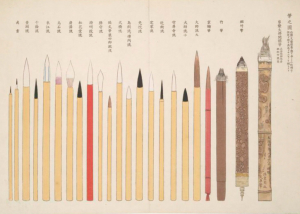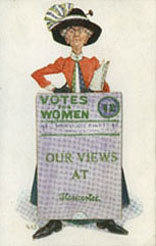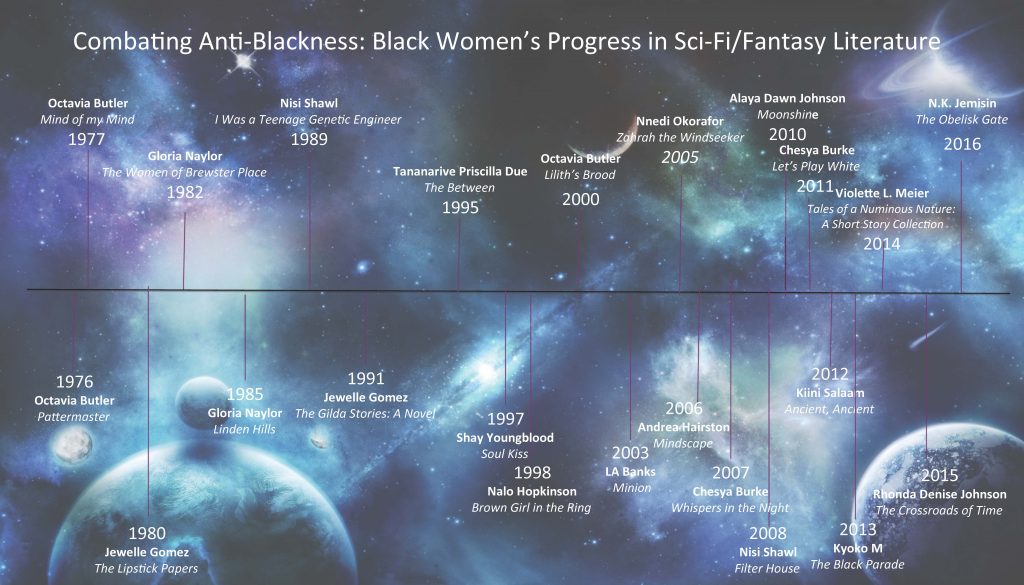
The Illinois Wesleyan annual theme, Women’s Power | Women’s Justice, calls attention to women’s contributions in a wide range of endeavors. Women are leaders, garner attention in the arts, and are being educated at better and better rates, BUT these examples of success are relatively new. This annual theme invites us to cross, intersect, and transcend borderlands in the ways we think about others and ourselves by deconstructing notions of gender and identity.
Banned Books Week is an annual event celebrating the freedom to read. Held this year from S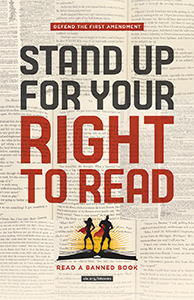 September 25 through October 1, it highlights the value of free and open access to information. Maya Angelou, a writer beloved by many, is the most banned/challenged author in the United States. A challenge is an attempt to remove or restrict materials, based upon the objections of a person or group. A banning is the removal of those materials. Challenges do not simply involve a person expressing a point of view: rather, they are an attempt to remove material from the curriculum or library, thereby restricting the access of others. As such, they are a threat to freedom of speech and choice. The Ames Library invites you to challenge censorship, and support both the freedom of access to information AND to celebrate the works of women authors.
September 25 through October 1, it highlights the value of free and open access to information. Maya Angelou, a writer beloved by many, is the most banned/challenged author in the United States. A challenge is an attempt to remove or restrict materials, based upon the objections of a person or group. A banning is the removal of those materials. Challenges do not simply involve a person expressing a point of view: rather, they are an attempt to remove material from the curriculum or library, thereby restricting the access of others. As such, they are a threat to freedom of speech and choice. The Ames Library invites you to challenge censorship, and support both the freedom of access to information AND to celebrate the works of women authors.
Found below are the most frequently challenged books of 2015 by female authors.
 Alison Bechdel’s Fun Home: A Family Tragicomic – Challenged as recommended, not required, summer reading for incoming freshman at Duke University in Durham, N.C. (2015) because some students objected to the novel’s “depictions of lesbian sexuality, arguing that the book is borderline pornographic and they shouldn’t have been asked to read it,” Similar criticisms have been levied by opponents at other colleges and universities that have taught the book, including College of Charleston – where state lawmakers threatened to defund the summer reading program for featuring it – and the University of Utah. Both institutes stood by the book which tells the story of a lesbian coming to terms with her own sexuality as she over time discovers that her distant father is also gay. Challenged, but retained at Crafton Hills College, a community college in Yucaipa, Calif. (2015) despite a student’s request to remove the book because it was “objectionable.” One of the most celebrated graphic novels of its generation a finalist for the 2006 National Book critics Circle Award), the theatrical adaption won the Tony Award for Best Musical, and numerous awards, in 2015. Source: Newsletter on Intellectual Freedom, Sept. 2015.pp. 147-49; 161-62.
Alison Bechdel’s Fun Home: A Family Tragicomic – Challenged as recommended, not required, summer reading for incoming freshman at Duke University in Durham, N.C. (2015) because some students objected to the novel’s “depictions of lesbian sexuality, arguing that the book is borderline pornographic and they shouldn’t have been asked to read it,” Similar criticisms have been levied by opponents at other colleges and universities that have taught the book, including College of Charleston – where state lawmakers threatened to defund the summer reading program for featuring it – and the University of Utah. Both institutes stood by the book which tells the story of a lesbian coming to terms with her own sexuality as she over time discovers that her distant father is also gay. Challenged, but retained at Crafton Hills College, a community college in Yucaipa, Calif. (2015) despite a student’s request to remove the book because it was “objectionable.” One of the most celebrated graphic novels of its generation a finalist for the 2006 National Book critics Circle Award), the theatrical adaption won the Tony Award for Best Musical, and numerous awards, in 2015. Source: Newsletter on Intellectual Freedom, Sept. 2015.pp. 147-49; 161-62.
 Gennifer Choldenko’s Al Capone Does my Shirts – Challenged on the New York state elementary-and middle school- reading lists (2015) because complainants said the book “perpetuates negative stereotypes by touting the infamous gangster Al Capone.” The two sequels in Choldenko’s “Tales from Alcatraz” novels were also challenged: Al Capone Shines my Shoes and Al Capone Does my Homework. Capone was a prisoner at Alcatraz from 1935 to 1939. The book was named a Newbery Honor selection, an ALA Notable Children’s Book, and in 2007 it received the California Young Reader Medal. Source: Newsletter on Intellectual Freedom, July 2015, p. 96
Gennifer Choldenko’s Al Capone Does my Shirts – Challenged on the New York state elementary-and middle school- reading lists (2015) because complainants said the book “perpetuates negative stereotypes by touting the infamous gangster Al Capone.” The two sequels in Choldenko’s “Tales from Alcatraz” novels were also challenged: Al Capone Shines my Shoes and Al Capone Does my Homework. Capone was a prisoner at Alcatraz from 1935 to 1939. The book was named a Newbery Honor selection, an ALA Notable Children’s Book, and in 2007 it received the California Young Reader Medal. Source: Newsletter on Intellectual Freedom, July 2015, p. 96
 Linda de Haan and Stern Nijland’s King & King – Challenged at the Efland-Cheeks, N.C. Elementary School (2015) after a third=grade teacher read the book to deal with a case of bullying. The teacher said he read the book after a boy in his class was called gay in a derogatory way and told he was acting like a girl. Two parents said the book was inappropriate for children that age, and at least one said parents should have been notified in advance. The complaints were withdrawn after the teacher and vice principal resigned from the school. Originally written in Dutch, the book has been published in at least eight languages and a theatrical version has been performed from Vienna to Mexico City. The image of the princes kissing each other at their wedding on the final page has been cited by social conservatives as “gay-rights movements undermining religious freedom.” Source: Newsletter on Intellectual Freedom, July 2015, pp. 118-19.
Linda de Haan and Stern Nijland’s King & King – Challenged at the Efland-Cheeks, N.C. Elementary School (2015) after a third=grade teacher read the book to deal with a case of bullying. The teacher said he read the book after a boy in his class was called gay in a derogatory way and told he was acting like a girl. Two parents said the book was inappropriate for children that age, and at least one said parents should have been notified in advance. The complaints were withdrawn after the teacher and vice principal resigned from the school. Originally written in Dutch, the book has been published in at least eight languages and a theatrical version has been performed from Vienna to Mexico City. The image of the princes kissing each other at their wedding on the final page has been cited by social conservatives as “gay-rights movements undermining religious freedom.” Source: Newsletter on Intellectual Freedom, July 2015, pp. 118-19.
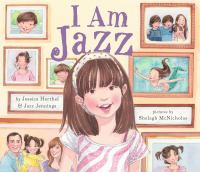 Jessica Herthel and Jazz Jenning’s I am Jazz – Canceled as a planned reading in the Mount Horeb, Wis. School District (2015) after the Florida-based Liberty Counsel group threatened to sue. The children’s book is the story of a transgender child based on the real-life experience of Jazz Jennings. On July 15th, 2015, the reality television series featuring Jazz Jennings premiered to positive reviews. Source: Journal of Intellectual Freedom and Privacy, Spring 2016, pp. 35-36.
Jessica Herthel and Jazz Jenning’s I am Jazz – Canceled as a planned reading in the Mount Horeb, Wis. School District (2015) after the Florida-based Liberty Counsel group threatened to sue. The children’s book is the story of a transgender child based on the real-life experience of Jazz Jennings. On July 15th, 2015, the reality television series featuring Jazz Jennings premiered to positive reviews. Source: Journal of Intellectual Freedom and Privacy, Spring 2016, pp. 35-36.
 Gayle Forman’s Just One Day – Challenged, but retained in the Rosemount, Minn. middle and high school libraries (2015) despite a parent’s concern about “a graphic sex scene, underage drinking [and] date rape” and also “inappropriate language.” The parent suggested the district remove it from all Rosemount-Apple Valley-Egan libraries. The book centers on a teenager, Allyson, who spends one romantic day in Paris with a mysterious actor and later decides she must leave college and return to Europe. Source: AL Direct, Nov 24, 2015; Journal Intellectual Freedom and Privacy, Spring 2016, pp. 53-54.
Gayle Forman’s Just One Day – Challenged, but retained in the Rosemount, Minn. middle and high school libraries (2015) despite a parent’s concern about “a graphic sex scene, underage drinking [and] date rape” and also “inappropriate language.” The parent suggested the district remove it from all Rosemount-Apple Valley-Egan libraries. The book centers on a teenager, Allyson, who spends one romantic day in Paris with a mysterious actor and later decides she must leave college and return to Europe. Source: AL Direct, Nov 24, 2015; Journal Intellectual Freedom and Privacy, Spring 2016, pp. 53-54.
 Ellen Hopkins’s Glass – Removed at the Standard Middle School in Bakersfield, Calif. (2015) along with the two other titles in the “Crank Trilogy” after a parent complained about the sex, violence, drugs, and alchol in the book. The book follows the life of a girl named Kristina and her battle wtih addiction to methamphetamine. According to Simon and Schuster’s website, the book is recommended for children who are at least 14 years old. The novel was a New York Time bestseller, a Quillis Award nominee, and was awarded the Book sense Top 10, NYPL Recommended for Teens, PSLA Top Ten for Teens, Charlotte Award, IRA Young Adult Choices Award, SSLI Honor book Award, and Gateway Readers Award. Source: Journal of Intellectual Freedom and Privacy, Spring 2016, p 31.
Ellen Hopkins’s Glass – Removed at the Standard Middle School in Bakersfield, Calif. (2015) along with the two other titles in the “Crank Trilogy” after a parent complained about the sex, violence, drugs, and alchol in the book. The book follows the life of a girl named Kristina and her battle wtih addiction to methamphetamine. According to Simon and Schuster’s website, the book is recommended for children who are at least 14 years old. The novel was a New York Time bestseller, a Quillis Award nominee, and was awarded the Book sense Top 10, NYPL Recommended for Teens, PSLA Top Ten for Teens, Charlotte Award, IRA Young Adult Choices Award, SSLI Honor book Award, and Gateway Readers Award. Source: Journal of Intellectual Freedom and Privacy, Spring 2016, p 31.
 Cheryl Kilodavis’s My Princess Boy: A Mom’s Story about a Young Boy Who Loves to Dress Up – Challenged, but retained at the Hook County Library in Granbury, Tex. (2015) despite complaints that the book promotes “reversion” and “the gay lifestyle.” the Hook County Library Advisory Board voted to keep the book in the library. The controversy comes at the same time as the Hook County Clerk refused to sign off on same-sex marriage licenses. The book is based on the author’s son who prefers to wear clothes that some people consider feminine. Source: Newsletter on intellectual Freedom, July 2015, pp. 93-94; Sept. 2015, p. 160
Cheryl Kilodavis’s My Princess Boy: A Mom’s Story about a Young Boy Who Loves to Dress Up – Challenged, but retained at the Hook County Library in Granbury, Tex. (2015) despite complaints that the book promotes “reversion” and “the gay lifestyle.” the Hook County Library Advisory Board voted to keep the book in the library. The controversy comes at the same time as the Hook County Clerk refused to sign off on same-sex marriage licenses. The book is based on the author’s son who prefers to wear clothes that some people consider feminine. Source: Newsletter on intellectual Freedom, July 2015, pp. 93-94; Sept. 2015, p. 160
 Jhumpa Lahiri’s The Namesake – Recommended for removal by the ad-hoc literature committee of the Coeur d’Alene, Idaho, School District (2015) because it contains “descriptions of sexual conduct that are too explicit for high school seniors.” The novel examines being caught between two conflicting cultures with highly distinct religious, social, and ideological differences. A film adaption of the novel was released in the United States, Canada, United Kingdom, and India in March 2006. The Indian-Bengali American author won the 2000 Pulitzer Prize for Fiction and was awarded the 2014 National Medal of Arts and Humanities at a White House ceremony. Source: Journal of Intellectual Freedom and Privacy, Spring 2016, p. 33.
Jhumpa Lahiri’s The Namesake – Recommended for removal by the ad-hoc literature committee of the Coeur d’Alene, Idaho, School District (2015) because it contains “descriptions of sexual conduct that are too explicit for high school seniors.” The novel examines being caught between two conflicting cultures with highly distinct religious, social, and ideological differences. A film adaption of the novel was released in the United States, Canada, United Kingdom, and India in March 2006. The Indian-Bengali American author won the 2000 Pulitzer Prize for Fiction and was awarded the 2014 National Medal of Arts and Humanities at a White House ceremony. Source: Journal of Intellectual Freedom and Privacy, Spring 2016, p. 33.
 Juliet Mariller’s Daughter of the Forest – Challenged, but retained in the Warrensburg, Mo. High School library (2015) despite a rape scene in the book. The book is a historical fantasy novel first published in 1999 and is loosely based on the legend of the Children of Lir and “The Six Swans” (a story that has many versions, including one by the Brothers Grimm). It was a finalist for the 2000 Aurealis Awards for Fantasy Novel and Won the 2001 American Library Association Alex Award. Source: Journal of Intellectual Freedom and Privacy, Spring 2016, p. 54.
Juliet Mariller’s Daughter of the Forest – Challenged, but retained in the Warrensburg, Mo. High School library (2015) despite a rape scene in the book. The book is a historical fantasy novel first published in 1999 and is loosely based on the legend of the Children of Lir and “The Six Swans” (a story that has many versions, including one by the Brothers Grimm). It was a finalist for the 2000 Aurealis Awards for Fantasy Novel and Won the 2001 American Library Association Alex Award. Source: Journal of Intellectual Freedom and Privacy, Spring 2016, p. 54.
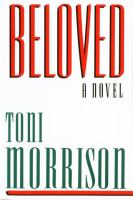 Toni Morrison’s Beloved – Challenged, but retained as an optional summer reading choice in the Satellite Beach, Fla. High School Advanced Placement classes (2015). A parent admitted not having read the entire book when he addressed the committee in September, but wanted the book banned because of what he called “porn content.” Challenged on the Fairfax County, Va. senior English reading list (2016) by a parent claiming “the book includes scenes of violent sex, including a gang rape, and was too graphic and extreme for teenagers.” The controversy led to legislation (House Bill 516) that calls for the Virginia Department of Education to create a policy that notifies parents of the content and then allows them to review the materials. The novel is inspired by the story of an African-American slave, Margaret Ganer, who escaped slavery in Kentucky in late January 1856 by fleeing to Ohio, a free state. It won the Pulitzer Prize for Fiction in 1988, was a finalist for the 1987 National Book Award, and was adapted into a 1998 movie of the same name starring Oprah Winfrey, a New York Times survey of writers and literary critics ranked it the best work of American fiction from 1981 to 2006. Source: Newsletter on Intellectual Freedom, Nov. 2015, p. 163; AL Direct, Febrary 9, 2016 and March 4, 2016.
Toni Morrison’s Beloved – Challenged, but retained as an optional summer reading choice in the Satellite Beach, Fla. High School Advanced Placement classes (2015). A parent admitted not having read the entire book when he addressed the committee in September, but wanted the book banned because of what he called “porn content.” Challenged on the Fairfax County, Va. senior English reading list (2016) by a parent claiming “the book includes scenes of violent sex, including a gang rape, and was too graphic and extreme for teenagers.” The controversy led to legislation (House Bill 516) that calls for the Virginia Department of Education to create a policy that notifies parents of the content and then allows them to review the materials. The novel is inspired by the story of an African-American slave, Margaret Ganer, who escaped slavery in Kentucky in late January 1856 by fleeing to Ohio, a free state. It won the Pulitzer Prize for Fiction in 1988, was a finalist for the 1987 National Book Award, and was adapted into a 1998 movie of the same name starring Oprah Winfrey, a New York Times survey of writers and literary critics ranked it the best work of American fiction from 1981 to 2006. Source: Newsletter on Intellectual Freedom, Nov. 2015, p. 163; AL Direct, Febrary 9, 2016 and March 4, 2016.
 Gayle E. Pittman’s This Day in June – Challenged, but retained at the Hood County Library in Granbury Tex. (2015) despite complaints that the book promotes “perversion” and the “gay lifestyle.” The Hood County Library Advisory Board voted to keep the book in the libarary. The controvery comes at the same time as the Hook County Clerk refused to sign off on same-sex marriage licenses. The book, about a pride parade, focuses on lesbian, gay, bisexual, and transgender history. Source: Newsletter on Intellectual Freedom, July 2015, pp. 93-94; Sept. 2015, p. 150
Gayle E. Pittman’s This Day in June – Challenged, but retained at the Hood County Library in Granbury Tex. (2015) despite complaints that the book promotes “perversion” and the “gay lifestyle.” The Hood County Library Advisory Board voted to keep the book in the libarary. The controvery comes at the same time as the Hook County Clerk refused to sign off on same-sex marriage licenses. The book, about a pride parade, focuses on lesbian, gay, bisexual, and transgender history. Source: Newsletter on Intellectual Freedom, July 2015, pp. 93-94; Sept. 2015, p. 150
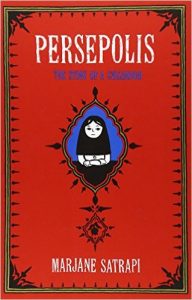 Marjane Satrapi’s Persepolis: The Story of a Childhood – Challenged, but retained at Crafton Hills College, a community college at Yucaipa, Calif. (2015) despite a student’s request to remove the book because it was “objectionable.” The book was a New York Times Notable Book, a Time magazine “Best Comix of the Year,” a San Francisco Chronicle and Los Angeles Times bestseller, the winner of the 2004 Alex Award, and named on the 2004 Best Books for Young Adults list. A film version was nominated for Best Animated Feature at the 80th Academy Awards in 2007. Source: Newsletter on Intellectual Freedom, Sept. 2015, pp. 161-62.
Marjane Satrapi’s Persepolis: The Story of a Childhood – Challenged, but retained at Crafton Hills College, a community college at Yucaipa, Calif. (2015) despite a student’s request to remove the book because it was “objectionable.” The book was a New York Times Notable Book, a Time magazine “Best Comix of the Year,” a San Francisco Chronicle and Los Angeles Times bestseller, the winner of the 2004 Alex Award, and named on the 2004 Best Books for Young Adults list. A film version was nominated for Best Animated Feature at the 80th Academy Awards in 2007. Source: Newsletter on Intellectual Freedom, Sept. 2015, pp. 161-62.
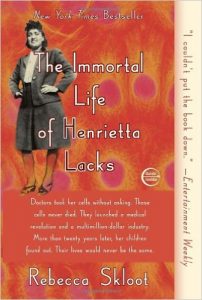 Rebecca Skloot’s The Immortal Life of Henrietta Lacks – Challenged as a summer reading assignment in the Knoxville, Tenn. high school system (2015) because a parent claimed the nonfiction book “has too much graphic information.” Henrietta Lacks was a poor black tobacco farmer whose cells – taken without her knowledge in 1951 – became one of the most important tools in medicine, vital for developing the polio vaccine, cloning, gene mapping, in vitro fertilization, and more. Winner of several awards, including the 2010 Chicago Tribune Heartland Prize for Nonfiction, the 2010 Welcome Trust Book Prize, the American Association for the Advancement of Science’s Award for Excellence in Science Writing, the 2011 Audie Award for Best Non-Fiction Audiobook, and a Medical Journalists’ Association Open Book Award, the book was featured in more than 60 media outlets, including New York Times, Oprah, NPR, and Entertainment Weekly. Source: Newsletter on Intellectual Freedom, Nov. 2015. P. 144.
Rebecca Skloot’s The Immortal Life of Henrietta Lacks – Challenged as a summer reading assignment in the Knoxville, Tenn. high school system (2015) because a parent claimed the nonfiction book “has too much graphic information.” Henrietta Lacks was a poor black tobacco farmer whose cells – taken without her knowledge in 1951 – became one of the most important tools in medicine, vital for developing the polio vaccine, cloning, gene mapping, in vitro fertilization, and more. Winner of several awards, including the 2010 Chicago Tribune Heartland Prize for Nonfiction, the 2010 Welcome Trust Book Prize, the American Association for the Advancement of Science’s Award for Excellence in Science Writing, the 2011 Audie Award for Best Non-Fiction Audiobook, and a Medical Journalists’ Association Open Book Award, the book was featured in more than 60 media outlets, including New York Times, Oprah, NPR, and Entertainment Weekly. Source: Newsletter on Intellectual Freedom, Nov. 2015. P. 144.
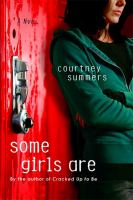 Courtney Summers’s Some Girls Are – Pulled from the freshmen Honors English I summer reading list at West AShley High School in Charleston, S.C. (2015) after a parent complained about the novel’s dark and explicit content. The book is about a high school senior who is ostracized and bullied by her former friends after she reports an attempted rape by a popular boy. Source: Newsletter on Intellectual Freedom, Sept. 2015, pp. 146-47.
Courtney Summers’s Some Girls Are – Pulled from the freshmen Honors English I summer reading list at West AShley High School in Charleston, S.C. (2015) after a parent complained about the novel’s dark and explicit content. The book is about a high school senior who is ostracized and bullied by her former friends after she reports an attempted rape by a popular boy. Source: Newsletter on Intellectual Freedom, Sept. 2015, pp. 146-47.
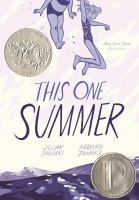 Jilian Tamaki and Mariko Tamaki’s This One Summer – Removed from one elementary school library and restricted at three Florida high school libraries in Longwood (2015). In response to a complaint from a parent about the graphic novel’s language. It is a coming of age story about two preteen friends, Rose and Windy, during a summer in Awago, a small beach town. The book won the 2015 Printz Honor, Caldecott Honor award, Eisner Award, and the 2014 Ignatz Award for Outstanding Graphic Novel.
Jilian Tamaki and Mariko Tamaki’s This One Summer – Removed from one elementary school library and restricted at three Florida high school libraries in Longwood (2015). In response to a complaint from a parent about the graphic novel’s language. It is a coming of age story about two preteen friends, Rose and Windy, during a summer in Awago, a small beach town. The book won the 2015 Printz Honor, Caldecott Honor award, Eisner Award, and the 2014 Ignatz Award for Outstanding Graphic Novel.
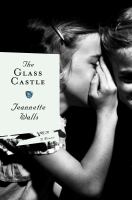 Jeannetter Walls’s The Glass Castle: A Memoir – Suspended at Ambridge, PA. High School (2015) because the book is “racist and sexually explicit.” The challenged memoir is about growing up in poverty with a father who spent his money on alcohol and a mother who became homeless. Published in 2005, the memoir sent a total of 261 weeks on the New York Times bestseller list and is now under development as a film by paramount. By late 2007m The Glass Castle had sold over 2.7 million copies, had been translated into 22 languages, and received the Christopher award, the American Library Association’s Alex Award (2006), and the Books for Better Living Award. Source: Newsletter on Intellectual Freedom, Nov. 2015, pp. 143-44.
Jeannetter Walls’s The Glass Castle: A Memoir – Suspended at Ambridge, PA. High School (2015) because the book is “racist and sexually explicit.” The challenged memoir is about growing up in poverty with a father who spent his money on alcohol and a mother who became homeless. Published in 2005, the memoir sent a total of 261 weeks on the New York Times bestseller list and is now under development as a film by paramount. By late 2007m The Glass Castle had sold over 2.7 million copies, had been translated into 22 languages, and received the Christopher award, the American Library Association’s Alex Award (2006), and the Books for Better Living Award. Source: Newsletter on Intellectual Freedom, Nov. 2015, pp. 143-44.
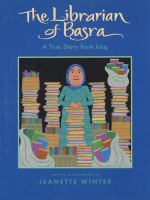 Jeanette Winter’s The Librarian of Basra: A True Story from Iraq – Challenged in the Duval County, Fla. public schools (2015) because a coalition of parents believes the book is inappropriate for promoting another religion that is not Christianity and is too violent for young children, Critics claim the book promotes “the Koran and praying to Muhammad.” The true story is about a librarian works with members of the community to keep the books safe until the war is over and a new library can be built. Duval County public school libraries have a banned books list of ten literary works, includig Roald Dahl’s Revolting Rhymes, Tom Robbins’ Even Cowgirls Get the Blues, and Tony Kushner’s Angels in America – which has also been removed from a textbook, reported The Guardian. Source: Newsletter on Intellectual Freedom, Sept. 2015, pp. 145-46.
Jeanette Winter’s The Librarian of Basra: A True Story from Iraq – Challenged in the Duval County, Fla. public schools (2015) because a coalition of parents believes the book is inappropriate for promoting another religion that is not Christianity and is too violent for young children, Critics claim the book promotes “the Koran and praying to Muhammad.” The true story is about a librarian works with members of the community to keep the books safe until the war is over and a new library can be built. Duval County public school libraries have a banned books list of ten literary works, includig Roald Dahl’s Revolting Rhymes, Tom Robbins’ Even Cowgirls Get the Blues, and Tony Kushner’s Angels in America – which has also been removed from a textbook, reported The Guardian. Source: Newsletter on Intellectual Freedom, Sept. 2015, pp. 145-46.
 Jeanette Winter’s Nasreen’s Secret School: A True Story from Afghanistan – Challenged in the Duval County, Fla. public schools (2015) because a coalition of parents believes the book is inappropriate for promoting another religion that is not Christianity and is too violent for young children, Critics claim the book promotes “the Koran and praying to Muhammad.” The true story is about a librarian works with members of the community to keep the books safe until the war is over and a new library can be built. Duval County public school libraries have a banned books list of ten literary works, includig Roald Dahl’s Revolting Rhymes, Tom Robbins’ Even Cowgirls Get the Blues, and Tony Kushner’s Angels in America – which has also been removed from a textbook, reported The Guardian. Challenged at the Eau Claire, Wis. schools (2015) because the book contains an Islamic prayer. The book is about the Taliban taking control of an Afghan village and prevent girls from going to school. After Nasreen’s father is kidnapped and presumed killed, her grandmother smuggles her each day to an underground school where she can learn to read and write. Source: Newsletter on Intellectual Freedom, Sept. 2015, pp. 145-46.
Jeanette Winter’s Nasreen’s Secret School: A True Story from Afghanistan – Challenged in the Duval County, Fla. public schools (2015) because a coalition of parents believes the book is inappropriate for promoting another religion that is not Christianity and is too violent for young children, Critics claim the book promotes “the Koran and praying to Muhammad.” The true story is about a librarian works with members of the community to keep the books safe until the war is over and a new library can be built. Duval County public school libraries have a banned books list of ten literary works, includig Roald Dahl’s Revolting Rhymes, Tom Robbins’ Even Cowgirls Get the Blues, and Tony Kushner’s Angels in America – which has also been removed from a textbook, reported The Guardian. Challenged at the Eau Claire, Wis. schools (2015) because the book contains an Islamic prayer. The book is about the Taliban taking control of an Afghan village and prevent girls from going to school. After Nasreen’s father is kidnapped and presumed killed, her grandmother smuggles her each day to an underground school where she can learn to read and write. Source: Newsletter on Intellectual Freedom, Sept. 2015, pp. 145-46.


